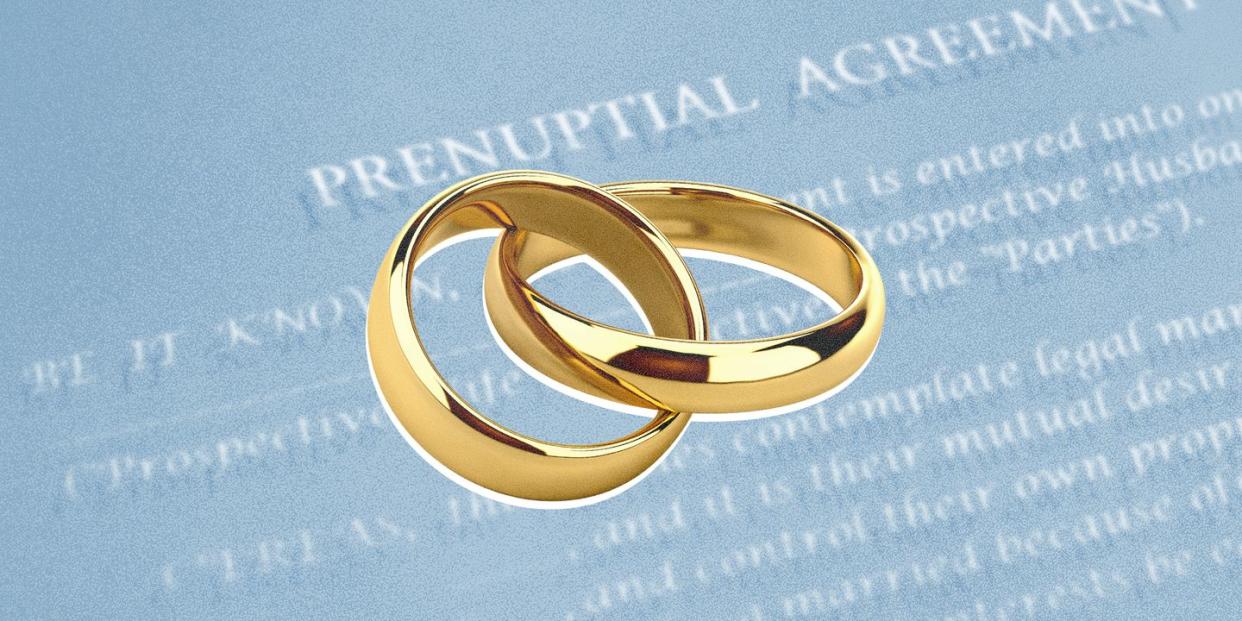First Comes Love... Then Comes a Prenup

“Open the newspaper, turn on the television–everybody is trying to screw everybody over,” said Neal Hersh, founding partner of Los Angeles’s Hersh Mannis law firm. “If you say your word is your bond, put it in writing.”
Thus is the case for the prenuptial agreement, casually know as a “prenup.” With American divorce rates hovering at around forty to fifty percent, these preventative contracts before marriages have skyrocketed in popularity. In a recent study conducted by the American Academy of Matrimonial Lawyers, 62% of lawyers surveyed saw a rise in prenups from 2013 to 2016, with half of lawyers seeing a rise among millennials, especially.
But, what even is a prenup? And, more importantly, do you need one? T&C spoke with three skilled celebrity divorce lawyers to explain this phenomenon and how it may affect your impending marriage.
A quick disclaimer: laws vary state to state, so be sure to consult with an attorney in your state, if you’re considering a prenup.

What Is a Marriage Contract?
Laura Wasser has been dubbed “Hollywood’s Divorce Queen.” The Los Angeles lawyer has represented clients ranging from Ryan Reynolds to Angelina Jolie (twice) and was the inspiration and advisor for Laura Dern’s divorce attorney character in Marriage Story (she also represented Dern in her own divorce). Along with practicing law, Wasser now runs ItsOverEasy.com, an online divorce and mediation resource.
“The purpose of a prenup is to opt out of certain provisions that the couple would otherwise be entering into under the laws of their state,” Wasser said. “You design [a couple’s] own contract for how they want their money to be treated if they are to divorce in the future.”
Wasser explained that getting married is essentially opting into a contract your state has designed. A prenuptial agreement is the rewriting of that contract to suit the needs and preferences of the couple getting married.
Eleanor Alter, a high-profile family law attorney at New York’s Alter, Wolff & Foley firm, divided the prenup into three components. The first: “agree to what will happen if the parties get divorced.” The second: “agree what happens at the death of one of [the parties]” and decide whether to opt in or out of a state’s inheritance rights. And third: to “contract what will happen during the marriage,” though Alter stated that this final component is much rarer and more difficult to enforce.
Additionally, a prenup can, and often does, deal with the issue of spousal support, Hersh told us. “You may be a very very wealthy person and if you were getting divorced you would have to pay enormous alimony. You, in a prenup, may want to eliminate the alimony right of your soon-to-be spouse or put a maximum on it,” he said.
There have also been cases where couples asked for stipulations regarding children, religion, or even sex written into their prenups, but none of the lawyers we spoke to recommended these additions, as they are difficult to negotiate and nearly impossible to enforce.
“I believe that the more simple the prenup the better chance you have at having it really enforceable,” Alter said.
Who Should Get a Prenup?
It can be confusing to figure out whether a prenuptial agreement is right for you. They can be expensive, not to mention, they entail a lot of time and effort. According to all of the lawyers spoken with, the most important thing is that all parties are familiar with the laws in their state.
“I don’t necessarily think that everybody needs a prenup; I think that everybody needs to know the law,” Wasser said. “So if you know the law and if you’re comfortable with the law, then you don’t need to have a prenuptial agreement.”
Alter broke down the people she believes are the best fit for a prenuptial agreement into four categories. The first is people with family money, meaning large inheritance prospects or a family business. The second are individuals with a valuable premarital business or a premarital career (the Mark Zuckerbergs and Jennifer Lawrences of the world). Alter’s third category includes anyone who has been married multiple times and has children from prior marriages. Finally, she told us that anyone who is marrying someone with a large age difference should probably have a prenup.
Since prenups mostly deal with premarital assets and wealth, our lawyers recommend getting one if you have either family or career money going into the marriage. This is especially the case with people who are on their second or third marriages.
“Once you have any wealth, either inherited or your own, you need one,” Hersh said. “Certainly if you’ve had one divorce already and you’re going to get married a second time, the rate of divorce statistics go up, and its likely you’ll get divorced a second time, and you need to protect whatever assets you have.”
As for who should not get a prenup? Basically anyone who is going into a marriage with few assets. In that case, the money the couple will earn, they’re making together. Should someone choose to keep all future earnings separate, according to Hersh, “I dare say you wouldn’t have a marriage.”

What to Expect When You’re Expecting (a Prenup)
So you’ve decided to get a prenup–now what? There are certain ground rules that the couple and the lawyers need to follow in order to make a prenup enforceable. Most states require that both individuals going into the prenup have attorneys. Many states also require full disclosure, meaning that everyone’s assets going into the marriage need to be revealed and discussed. This helps lawyers figure out how to structure the prenup and helps both members of the couple see what their options are. Additionally, all states require that if the prenup is written in English, and it’s not one party’s first language, that it be translated. Most states mandate that there is some sort of time requirement, so that there isn’t pressure to sign before walking down the aisle. Finally, and more vaguely, nothing deemed “unconscionable”–basically anything really absurd or cruel–can be put in a prenup, otherwise it would be unenforceable.
The first step is to find a lawyer and, preferably, a matrimonial lawyer that does a lot of prenups. Both parties need to have a lawyer and, so that one party cannot claim insufficient counsel, Hersh told us, “It’s as important if not more important that your fiancé has as good a lawyer as you have.”
Alter pointed out that the lawyers must be from the state where you’ll be living, not where you’re getting married. Alter has even encountered differences in laws when a couple moves out of New York and into a Connecticut suburb. “If you think you might move… your lawyer should have [the other state’s lawyer] advise as well,” she said.
Once everyone has found and met with their lawyers, usually the two sides have a meeting to discuss options. “We are trying to do this collaboratively and we’re trying to keep everybody happy,” Hersh said. “We all have the same goal.” That goal is usually keeping everyone calm, while working out a fair arrangement.
After the deal is agreed upon, the lawyers will draft an agreement. When that is done, and sometimes there may be a few drafts, the prenup is ready to sign. There can, however, be some modifications in the signing process. For example, Hersh often has a judge supervise the signing and question both parties. This prevents one party from later making negative claims about the signing, as they will have sworn under oath that they were consenting, had access to a good lawyer, and so on. Hersh also sometimes videos these signings for even further assurance, should there be disputes later on.
Ideally, the prenup should be signed as far before the wedding as possible. “It should be signed sealed and put away in a drawer a month in advance,” Wasser said. “Most people take a lot of time planning their weddings and they’re doing all of these things that very last month and weeks before. They’re having their final dress fittings and doing their cake tasting and going to the venue and picking the flowers. It would be nice to be able to go through that process not concurrently with negotiating your prenup.”
During this negotiation, it is also important to make sure you get across your own feelings and preferences. “Take control of the situation and make sure that you and your partner are having conversations, rather than letting them all filter through the communications between attorneys,” Wasser said. “You have to handle this process because after the agreement is signed and put away, you’re living with this person for the rest of your life, hopefully.”
While you don’t want to have your prenup act as a black cloud over your marriage, it’s also important to pay attention to how your partner handles the process. Alter, who has practiced law for fifty-five years, said, “You can tell a lot about the person you’re marrying based on how they conduct [the prenup]. If someone says, ‘Take it or leave it’ or ‘Mommy says…’ or ‘Daddy says…’–be careful.”

Prenups Come with a Cost
The lawyers we spoke with do not come cheap. Wasser charges $950 per hour and said a prenup can cost around $25,000. Alter told us that she’s seen very complicated prenups run up to $100,000, though she admits that is uncommon. However, prices can vary dramatically depending on your state and lawyer.
“You don’t have to get a Rolls Royce or Ferrari kind of lawyer, but you need a lawyer,” Hersh said, as he does not believe cost should be a barrier for a prenup. “It’s just like saying, with all due respect, if something is wrong health-wise would you say, ‘Oh well that doctor costs a little too much, I’m not going to attend to it.’ You could do that, but that’s sort of cutting off your nose to spite your face. So, it wouldn’t be my advice.”
Hersh noted that this is even more the case with previously married individuals. “People who have been through a divorce understand that there’s a need for these things. They may not like it, but they get it,” he said.
A Fading Stigma
Prenuptial agreements certainly require difficult conversations between couples, and the topic is not always met with positive reactions. However, our lawyers believe that, while the subject will never be romantic, it is important for many individuals.
“You’re negotiating a divorce before people get married, which is a pretty difficult thing,” Alter said. “It’s a terrible process.”
The fact that the process is difficult does not make it less necessary. Wasser believes that engaged couples should have these sorts of conversations – involving income, the division of property, and the future – regardless of whether they actually decide to get a prenup.
“I do believe–and I’ve been doing this for 25 years and I’ve done a lot of prenups–that if the couple has the kind of conversations that go into a prenup, whether they have a prenup or not, but have some very realistic, probably unsexy and unromantic conversations leading up to their marriage they will likely stay together longer,” Wasser said. “It’s not just all about romance and butterflies in your stomach and sexiness, it also has to do with some real issues and real expectations of what roles you will each be filling in the relationship.”
Clearly the stigma against prenups is becoming less and less noticeable. Both Alter and Wasser agreed that they have many more clients asking for prenups than ever before, in accordance with national statistics. They both believe it has to do with individuals getting married later, wealthier, and wiser, and that a greater number of women now have their own careers and assets, giving them more equal negotiating power. “I also think it’s not quite as taboo as it used to be,” Wasser said.
While the lawyers disagreed on whether to play hardball in the negotiation (you can always be nicer later) or to be generous (it helps the relationship and makes the process less onerous), they agreed on a few key pieces of advice. Alter, Wasser, and Hersh all advise their clients to be honest and communicative, and to keep in mind their love for their fiancé throughout the often trying negotiations.
“If you want to have a marriage that’s going to work, my best advice to you, as a divorce attorney, would be to be communicative and considerate of your spouse and really think about what it is you’re doing,” Wasser said. “Even if that means having some difficult conversations at times.”
You Might Also Like

